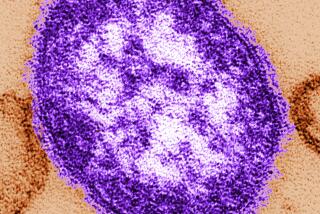Some doctors are flubbing measles diagnoses: Here’s why
- Share via
Public health officials are warning that some physicians are missing diagnoses of measles cases. Here are a few reasons why.
Missing the clues:
The initial symptoms — coughing, high fever, sneezing and red, watery eyes — appear in many other illnesses.
Physicians should be aware of some clues that can help them. One is the appearance of tiny white spots, known as Koplik spots, inside the cheek that develop a few days after initial symptoms begin, said Dr. James Cherry, a UCLA measles expert and primary editor of the Textbook of Pediatric Infectious Diseases.
Some healthcare providers miss the telltale rash that develops with measles. The California Department of Public Health said such patients may not have been asked about international travel or contact with global travelers in places like airports.
Forgetting that vaccinated people can fall ill:
There’s a 5% chance of vaccine failure in people who have received only one dose of the measles vaccine, and less than 1% chance of failure in those who received two.
Other inoculated people might get a milder version of measles, such as those who got the vaccine in the 1960s, ‘70s and ‘80s. “The temperature isn’t as high, they don’t appear as sick, they may not even have significant cough,” Cherry said. And instead of one merged rash, the rash might appear in discrete splotches.
It’s important to diagnose measles patients promptly, so they can be quarantined and kept from spreading the virus to other people.
In the measles outbreak that hit California a year ago, among patients whose immunization records were available, 29% were fully vaccinated, receiving both doses of the measles vaccine. Of the remainder, 68% were unvaccinated and 3% received only one dose.
Recommendations for a second shot of the measles vaccine came in 1989. Most people born in 1989 or later probably have two doses of measles vaccine, but those born before then may have had only one dose. Cherry recommends that anyone who doesn’t know whether they’ve had two doses to get a dose of vaccine. There is no risk in getting a third dose of the vaccine.
A test can also be administered to determine if someone is immune to measles.
Ordering the wrong lab test:
Health providers may be inclined to order a blood test detecting something called IgM, a kind of antibody. It works fine for unvaccinated patients but may not detect measles in some patients whose vaccine has failed, Cherry said.
A better test, Cherry said, is done through a technique called PCR, using samples swabbed from the nose or the back of the throat or from urine.
Proper vaccine storage:
That was an issue between 1963 and 1972, Cherry said, when some vaccines were kept in refrigerator doors, where temperatures could change. Today there are more stringent storage requirements to ensure vaccines are stored properly, Cherry said.
More to Read
Sign up for Essential California
The most important California stories and recommendations in your inbox every morning.
You may occasionally receive promotional content from the Los Angeles Times.











